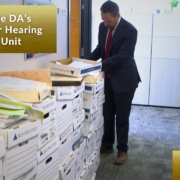DA Succeeds in Reversing Parole Board Policy on Banning Crime Scene and Autopsy Photos
San Diego County District Attorney Summer Stephan today announced that in a major victory for crime victims, public safety, and due process, the California Office of Administrative Law (OAL) has granted a petition filed by the San Diego DA’s Office, striking down a controversial policy by the California Board of Parole Hearings (BPH) that banned the submission of crime scene and autopsy photographs in parole hearings.
Based on a petition submitted by the District Attorney’s Office, the OAL determined that the Board’s policy—enacted without public input or proper regulatory procedure—constituted an illegal “underground regulation” under California’s Administrative Procedure Act. The ruling requires the Board to cease enforcement of the policy and to follow formal rulemaking procedures if it wishes to pursue any similar restrictions in the future.
“This is a huge win for justice, transparency, and for every crime victim and family who deserves to have their voices heard and the full truth of a crime considered in parole decisions,” said DA Stephan. “The Board’s attempt to erase the harsh realities of violent crimes from parole hearings was not only improper—it was a disservice to public safety and victims’ rights. We’re proud to have stood up for what’s right, and we thank the OAL for correcting the Board’s procedure.”
The now-invalidated policy prohibited prosecutors, victims, and other stakeholders from submitting photographs that the Board deemed “graphic,” including crime scene and autopsy photos. The DA’s Office argued that these images are vital for parole board commissioners to fully understand the nature and impact of crimes and to evaluate an inmate’s credibility and insight. The OAL’s decision reaffirms that all relevant, reliable evidence must be considered in parole proceedings.
In its petition, the DA included legal arguments, examples of hearings where such photos were instrumental, and public outcry from victims and their families who were denied the ability to submit these materials. The specific cases cited included:
- Frederick Walkey: Walkey murdered his girlfriend’s 2-year-old son by beating and biting him to death. During the parole hearing, he minimized his actions and deflected blame. The panel used autopsy photos and the report to determine he was being untruthful and lacked insight, leading to a parole denial.
- Dwight Culton: Culton claimed self-defense after brutally murdering a woman at an auto shop. The parole board referenced crime scene photos, police, and autopsy reports to find that Culton lacked insight and maintained a criminal mindset, which contributed to his parole denial.
- Charles Tyberg: Tyberg murdered a police officer with a .357 magnum. Commissioner Ruff examined autopsy photos to assess the extent of the injuries, helping evaluate Tyberg’s insight and truthfulness. The photos were used to justify a parole denial based on a lack of insight.
“Our office will continue to fight for the rights of victims and the integrity of the criminal justice process,” Stephan added. “This decision ensures that parole boards must base their decisions on the full record—not a sanitized version of events.”
The DA’s Lifer Hearing Unit handles about 600 cases each year. It represents the state and victims at parole hearings for inmates serving life sentences. It ensures dangerous offenders aren’t released prematurely and supports victims and families in participating in hearings. The unit also tracks cases, assists with legal challenges, and handles new types of parole. Due to changes in the law, many of these inmates are up for parole sooner than expected, and the Unit’s case load is increasing. hearings due to changes in state law.
Deputy District Attorney John Cross leads the Lifer Unit and drafted the petition that led to the change that will now allow crime scene and autopsy photos to be submitted as part of parole hearings.









